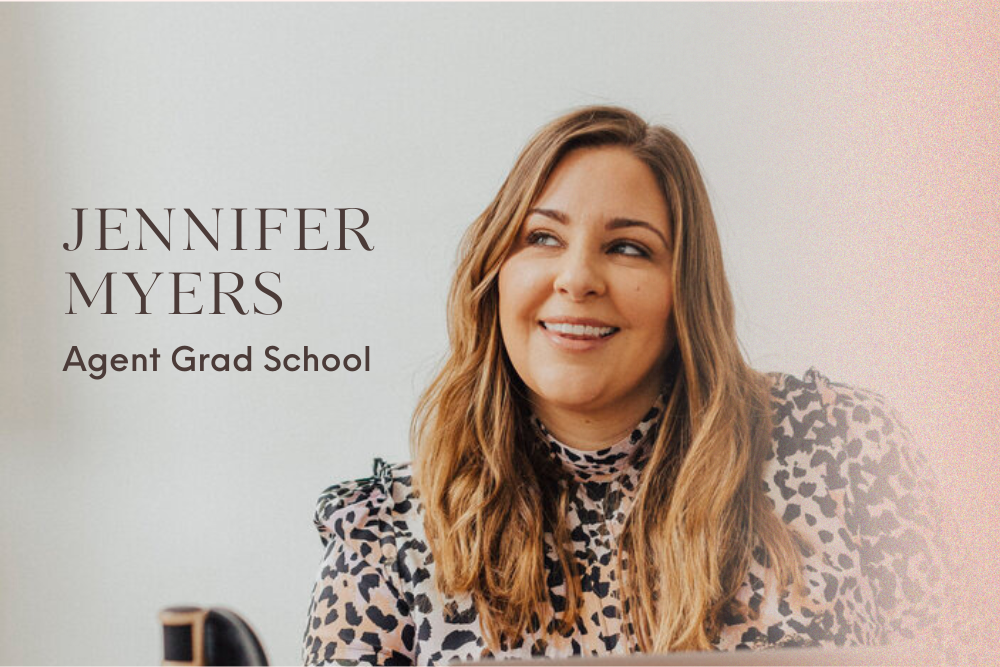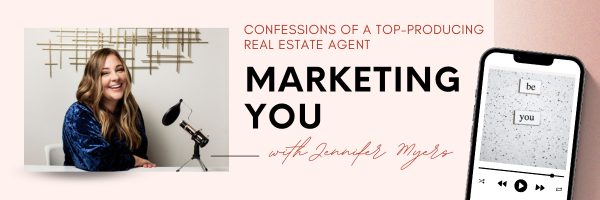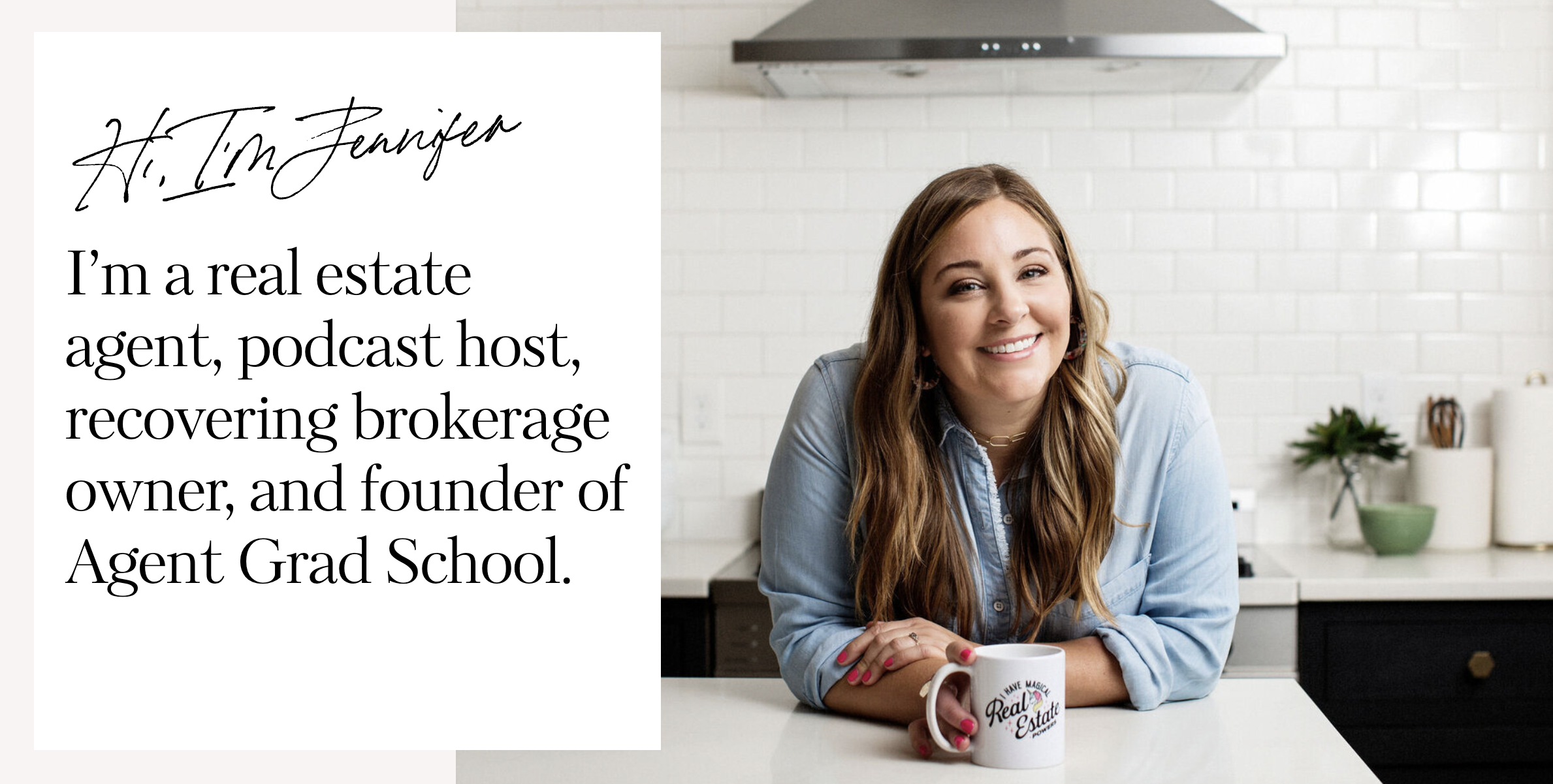It’s never too late to rebrand yourself. Just ask Taylor Swift, everybody’s favorite country-starlet-turned-pop-queen-turned-folk-artist-turned-cultural-icon.
Even if you don’t need to do a complete overhaul of your real estate business’s branding, you might benefit from a little fine-tuning.
The first step to developing your real estate brand—way before you start brainstorming taglines, looking into graphic designers, and ordering new yard signs—is defining your brand.
I recently caught an episode of Jennifer Myers’s podcast, Confessions of a Top-Producing Real Estate Agent, titled Marketing You.
Jennifer (who is also the founder of Agent Grad School) shared 5 questions real estate agents can ask themselves to figure out what differentiates them from other agents.
By asking yourself these 5 questions, you can formulate an answer to the question asked by all prospective clients: “Why should I choose you?”
Defining Your Real Estate Brand: 5 Questions To Ask Yourself
1) What made you want to become a real estate agent?
The first thing that comes to mind for many real estate agents is entrepreneurship, or flexibility, or more time to spend with my family. Those are all great reasons to become a real estate agent. But those reasons have no place in your branding and marketing, because they are all about YOU.
Jennifer says to dig deeper, and find one reason that is about helping other people. It doesn’t have to be the main reason (I mean, the main reason most of us go to work every day is because we need to make money, right?). It just needs to be one real, genuine reason for why you decided to become a real estate agent.
Related: Focus On Your “Why” To Be A Successful Real Estate Agent
Look back over your experiences, Jennifer advises, and think about whether any of those experiences influenced your decision. That might lead you closer to your answer.
When Jennifer looked back, she recalled a bad experience buying her first home. Her agent failed to tell her about what would have been a very helpful down payment assistance program, so Jennifer missed out on getting a really great deal. This bad experience helped to propel her into the real estate business, and it fueled her desire to make sure other first-time home buyers wouldn’t miss out on assistance programs.
“There were a lot of reasons why I became a real estate agent, but that was the one that actually [helped] other people,” Jennifer said. “I also just didn’t like working for other people. I wanted to be an entrepreneur. There are all sorts of other reasons. But the reason I chose to talk about in my marketing was the reason that helped other people.“
2) Who do you want to help?
I’m going to start with the same disclaimer Jennifer gave: this is not an invitation to discriminate or to violate Fair Housing Laws.
To answer this question, consider your answer to question #1, and factor in your unique skillset. Another way to phrase this question might be, “Who can I be most beneficial to?”
When Jennifer was just getting started, all she really knew about was homebuying and the common pitfalls for first-timers. This perfectly aligned with her reason (her “helping people” reason, that is).
So for Jennifer, her answer to this question was, “I want to help first-time homebuyers.” And a few years later, when her original clients were ready to sell, she expanded her focus to include first-time sellers, too.
That’s an important note Jennifer urges to keep in mind: whichever “niche” you create in the beginning can be scaled up and expanded as your business grows.
3) How will you help them?
Once you’ve defined who you want to help, you have to define how you’ll go about helping them. So ask yourself: What do they need help with? What emotions are they feeling? What challenges do they face?
Related: Are You An Emotionally-Intelligent Real Estate Agent?
Jennifer discovered that many would-be first-time home buyers are held back by the misconception that they have to put down 20%. To help these hopeful buyers, Jennifer knew she would need to be well-informed on any first-time home buyer loan programs and down payment assistance programs. So she did the research and talked to lenders, and became an expert on everything that would make home-buying more affordable for first-time buyers.
And that became her answer to question #3: “I will help make their first home more affordable.”
4) What do you want to be known for?
If people were talking about you behind your back, Jennifer says, what would you want them to be saying?
“Because that’s what everyone’s so worried about. ‘What are people going to think?’ Well, what do you want them to think? Define that, and then go be that…become a resource for that thing…become the most knowledgeable expert about all things that have to do with that—in my case, first-time home buyers.”
5) Who do you want to be for your clients?
I think there are different ways to interpret this question, but to me, it’s about defining the emotions you want to evoke in your clients. Do you want them to feel confident and empowered? Pampered and first-class? Free to be themselves and ask anything they want?
Jennifer wanted to be an example for her clients. She wanted to show them that they could do what she did: buy a home at the age of 23, with a $40K salary, without putting 20% down.
She also wanted to be like an approachable big sister her clients could come to with questions.
“But more than anything…I wanted to stand for possibility. Like, ‘I don’t know if you can buy a house right now, but let’s see what’s possible.'”
Based on her 18 years of success as an agent selling 553 homes and $273M in volume, it seems to have been the right strategy for her.
Developing your real estate brand is all about trial and error
You don’t have to stop everything you’re doing and work on your brand until you have it 100% perfect. Because, chances are, it’s not going to be 100% perfect. Developing your brand is an ongoing process. Yes, you should dedicate some chunks of time to work on this aspect of your business—but you also have to keep prospecting and marketing and showing and listing.
“You have to figure this out by putting things out into the world and seeing what works, what doesn’t work, what people resonate with,” Jennifer said.
Start with these questions, revisit them often, and continue to define who you are as a real estate brand: why you chose to be a real estate agent, who you want to help, how you help them, what you want to be known for, and who you want to be for your clients.
About Jennifer Myers & Agent Grad School
Agent Grad School, founded by Jennifer Myers, is the online business school where real estate agents learn a time-tested proven system for creating a 6 (or 7) figure business while still having a life, no matter what the market is doing, without needing a team to make it happen.
AGS teaches out-of-the box and counterintuitive strategies—the same strategies Jennifer herself implemented in her own real estate business—that not only bring clients to you like a magnet, but also help you create a highly profitable (and fun) real estate business.
To learn more, visit agentgradschool.com.







